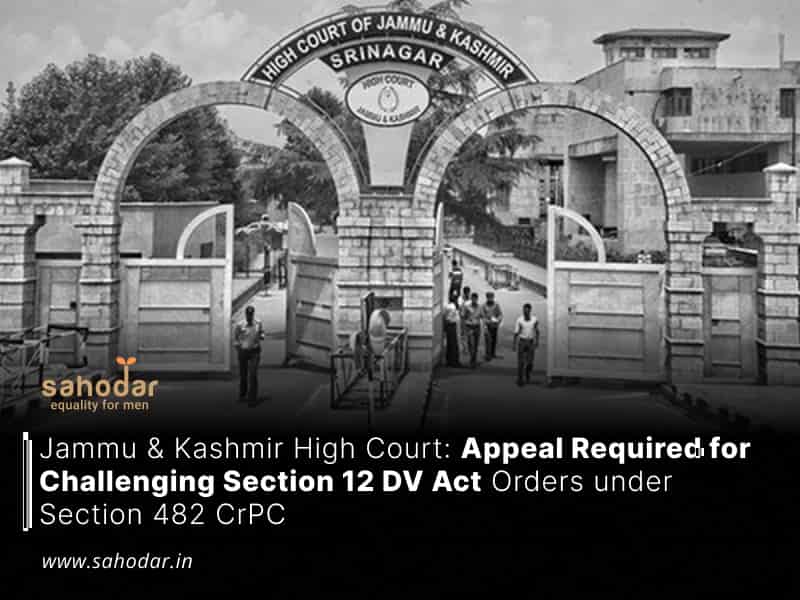Justice Sanjay Dhar of the Jammu and Kashmir and Ladakh High Court has clarified that challenging orders issued under Section 12 of the Protection of Women from Domestic Violence Act, 2005 (DV Act) directly through Section 482 of the Criminal Procedure Code (CrPC) is not permissible unless the statutory appeal process is utilized. In a recent case, a petition challenging the orders of a Judicial Magistrate under Section 12 of the DV Act was dismissed
“Without going into the question, whether or not the proceedings under the D.V.Act are of civil in nature, one thing is clear that the remedy of appeal is available to the petitioner against the impugned order. Without availing the said remedy the petitioner could not have rushed to this Court to file proceedings under Section 482 Cr.P.C or by invoking revisional powers of this Court”.
“In the present case, the petitioner initiated proceedings under the DV Act, requesting interim financial support and various reliefs, including shared housing. Initially, an ex-parte order issued on August 17, 2022, instructed the respondent to offer accommodation to Mrs. Balki. Subsequently, upon the respondent’s challenge, the trial Magistrate adjusted the relief by either arranging rental accommodation or providing the petitioner with Rs. 10,000 per month. Dissatisfied with this modification, the petitioner filed the current petition under Section 482 of the CrPC.”
Opposing the petitioner’s request, the respondent raised an initial objection to the validity of the petition, arguing that the order issued by the trial Magistrate falls under the purview of an appealable nature. Therefore, the petition under Section 482 of the Cr.P.C, in conjunction with Section 397 of the Cr.P.C, is not admissible. The legal counsel also contended that proceedings under the Domestic Violence Act (D.V. Act) are of a civil nature, rendering the Section 482 of the Cr.P.C petition inappropriate.
Justice Dhar, while rendering a decision on the matter, acknowledged that Section 29 of the DV Act expressly allows for an appeal to the Court of Session within 30 days from the date of the Magistrate’s order. This provision ensures the availability of a proper legal avenue for addressing grievances under the Act.
“If we have a look at th
e provisions contained in Section 29 of the D.V.Act, it provides that an appeal shall lie to the Court of Session within 30 days from the date on which the order is passed by a Magistrate. An order made by Magistrate under Section 12 of the D.V.Act is, therefore, appealable under Section 29 of the D.V.Act”, the court remarked.
Hence, the court ruled that the petitioner could not immediately approach the High Court using the authority granted by Section 482 and 397 of the Cr.P.C without first pursuing an appeal under Section 29 of the D.V. Act. Consequently, the petition was rejected.

